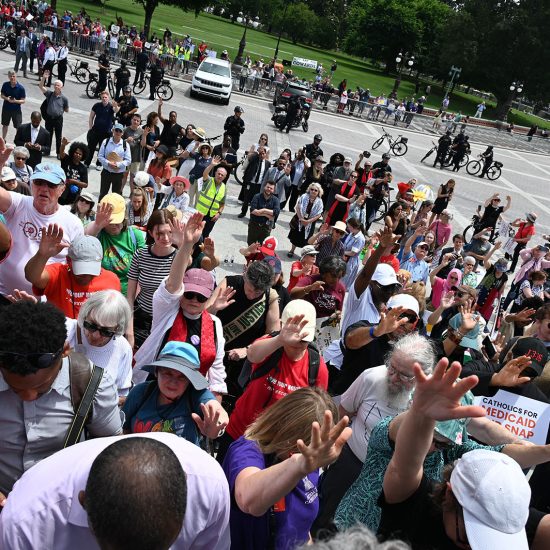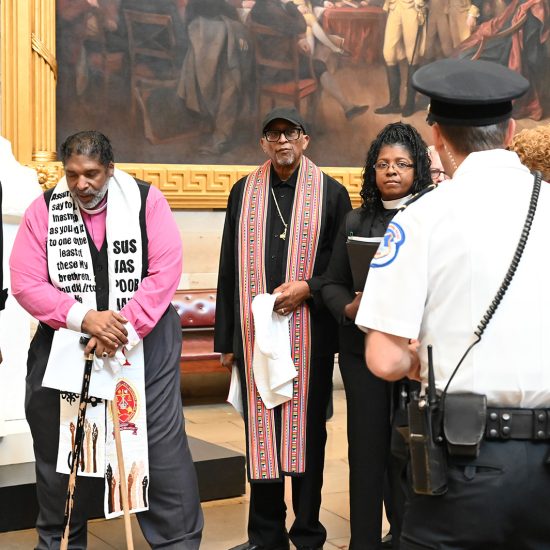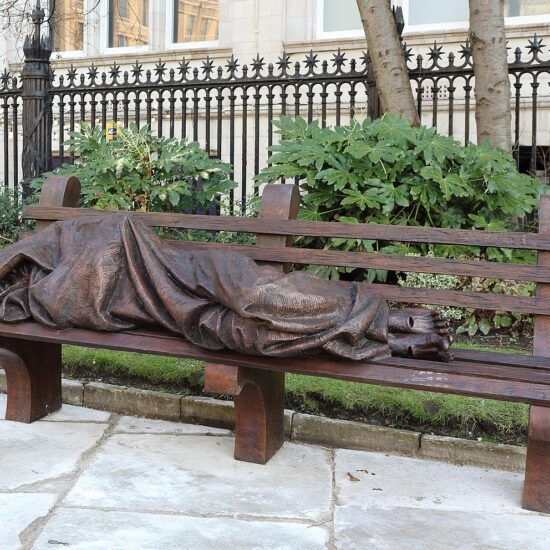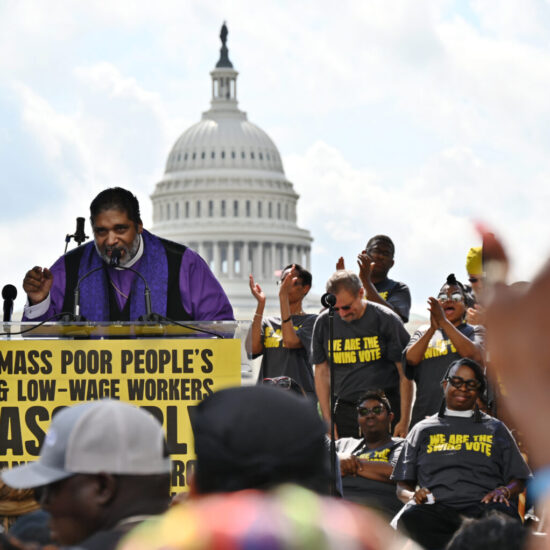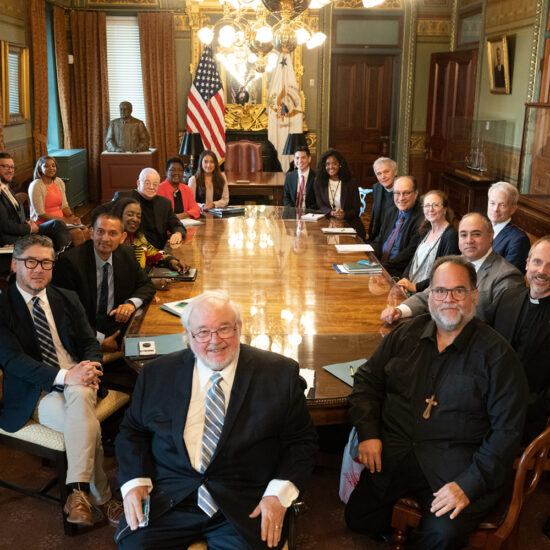JEFFERSON CITY – About 500 Missourians were challenged to "believe in the possible" during the June 9th Poverty Summit in Jefferson City. The Summit, led by Missourians to End Poverty, addressed five pillars of poverty in an attempt to mobilize attendees to combat the problem.
"When people from all walks of life join together, truly anything is possible," said Dave Leyland, executive director of the Community Action Partnership of Greater St. Joseph.
According to Summit materials, 781,842 Missourians are currently living in poverty, including more than 150,000 children. Leyland urged event participants to work to end such poverty. "Simply put, it's the right thing to do," he said.
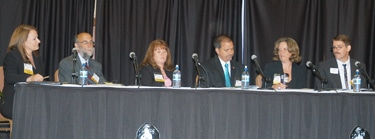
Andrea Routh, Sandy Rikoon, Liz Hager-Mace, John Coffman, Amy Blouin and Otto Fajen led a panel discussion on the five pillars of poverty at the June 9th Poverty Summit.
|
Linda McAnany, president of United Way of Central Missouri, spoke from the notes of John Bennett, a retired Disciples of Christ minister and outreach coordinator of Missouri IMPACT, a faith-based organization seeking to influence public poverty on justice issues. Bennett was ill the day of the Summit and unable to attend.
McAnany quoted Micah 6:8 and Isaiah 58:6-7, which list justice and providing for those without food, shelter or clothing. "The fight for social justice ignites and energizes all of us," she said.
She invited attendees to "dream, to envision a radically different life for those living in poverty."
The event focused on five pillars of poverty: hunger, health, education, housing and energy, and economic and family security.
Hunger
According to the Food Research and Action Center's 2008 State of the States Report, 310,000 Missouri families struggled to meet their basic food needs in 2007.
Sandy Rikoon, professor of rural sociology at the University of Missouri, emphasized that the number of people classified as "food insecure" is increasing each year and has more than doubled over the last decade.
"We don't lack for food in this country," he said. "We lack for access."
He pointed out that the costs of food insecurity are economic, social, physical and psychological. "The economic costs of food insecurity among adults include income loss, work absenteeism, higher demand for public benefits and social services, numerous chronic illnesses and increased health care expenditures," he wrote in his Hunger Case for Change.
Studies of children show that hunger is a significant predictor of chronic illness, low birth weight, lower school performance and developmental problems, he added.
In 2007, food insecurity affected more than 17 percent of Missourians under age 18, compared to 13.5 percent of adults.
Health
Missouri has one of the lowest eligibility rates for Medicaid, Andrea Routh said. Routh, executive director of the Missouri Health Advocacy Alliance, referenced recent failed efforts in the Missouri legislature to reinstate coverage to some living below the poverty rate who lost coverage due to budget cuts.
"When healthcare is unaffordable, it takes away the ability to save, plan for the future and, sometimes, to survive," she said. When people lose or don't have healthcare coverage, "the resources to get out of poverty are not obtainable."
Education
The state of Missouri needs a culture change, said Otto Fajen, legislative director for the Missouri National Education Association. He emphasized the need to look at opportunity rather than problems.
"It is vitally important to invest in early childhood education," Fajen said. In his Education Case for Change, he pointed out that "various studies of early childhood programs have shown long-term benefits, including better chances for graduation, less need for special education services and better success in life after high school."
He emphasized the need for adequate school funding and referenced policy recommendations that the MNEA is pushing. "The policy recommendations are expensive," he admitted. "But quality public education is a right; we need to hold our legislators to that."
Housing and Energy
"Safe, decent, affordable housing is a critical need," said Liz Hager-Mace, housing director for the Missouri Department of Mental Health.
Just to afford a one-bedroom apartment, a person needs to make at least $9.62 an hour, she said. A single parent with kids who wanted two bedrooms would need to make $12.46. "How many jobs in your area offer this with healthcare?" she asked.
John Coffman, attorney and consumer advocate, added that the housing needs to be energy-efficient. Often low-income housing isn't energy-efficient, he said, which leads to difficulty paying energy bills.
He emphasized a need for people to become involved in talking to legislators. "Almost never is there someone at the table to talk about the low-income," he said.
Family and Economic Security
"We're not doing well," said Amy Blouin, executive director of the Missouri Budget Project. "I know it's shocking. We are doing as bad as we possibly can in this country without being in a depression."
She referenced the 8.1 percent unemployment rate. "At the peak of the last recession, unemployment was at 6 percent," she said. The rate never fully recovered, she explained.
"Have we hit bottom?" she asked, noting that people often wait for a crash to know when to recover. "We need to decide if we've hit bottom. I think we have – it's time to recover."
"We can do this," she urged.
Summit attendees also heard from Sister Berta Sailer, co-director of Operation Breakthrough in Kansas City, which provides early childhood education along with a broad range of social services; Kimberly Keith, a Polk County entrepreneur who escaped poverty when her local community action agency gave her the resources to start her own business, which she uses to help others get out of poverty; and Doug Pitt, a Springfield business executive who founded Care to Learn, a foundation that provides emergency funding to meet hunger, health and hygiene needs to keep children in school.
Event organizers emphasized that this wasn't a one-day event, but a starting place to build contacts and resources. Participants were seated at tables with others from their geographic location. During a "Make the Possible Happen" time, participants had a chance to brainstorm ways to influence measurable differences in the five pillars in Missouri over the next 10 years.
After discussion, participants filled out an action form, outlining specific actions each is willing to take to combat poverty.
For more information, visit www.communityaction.org .
Jennifer Harris is News Writer for Word&Way.

